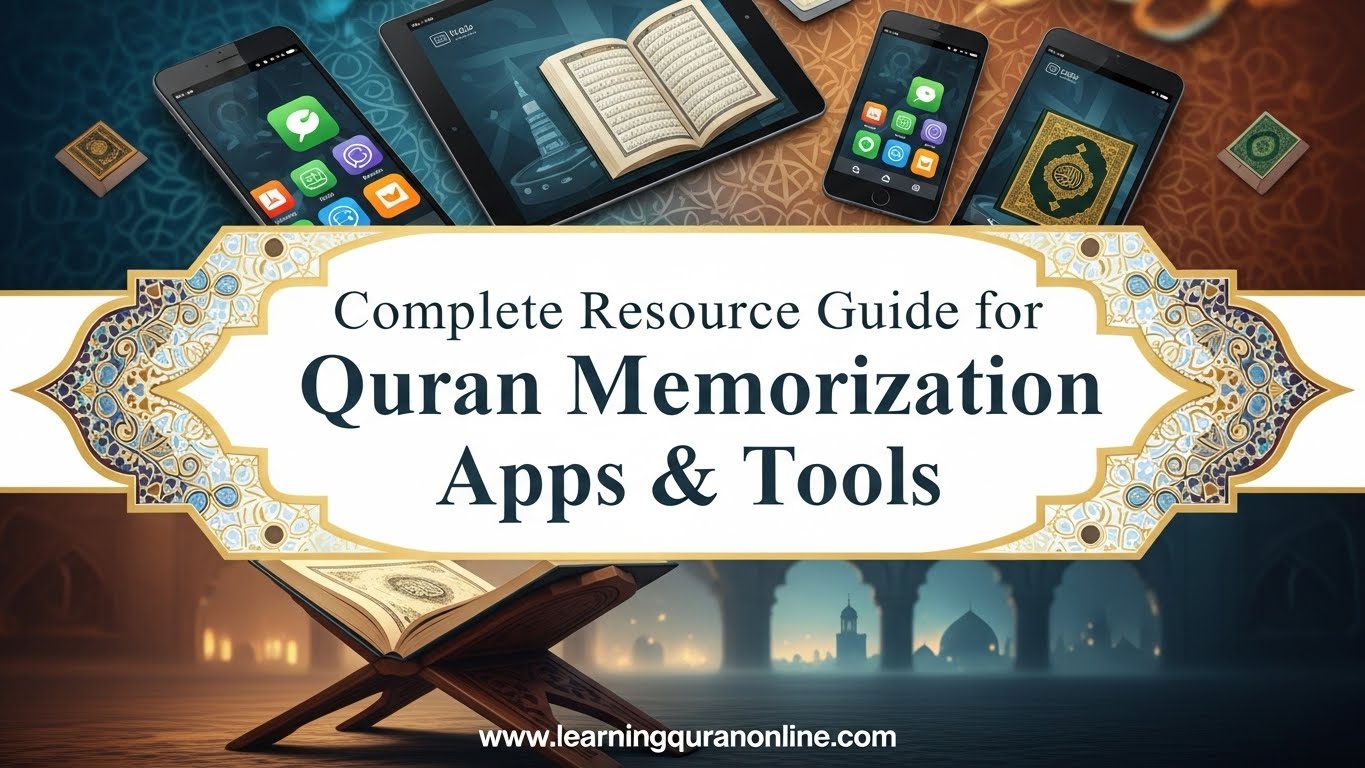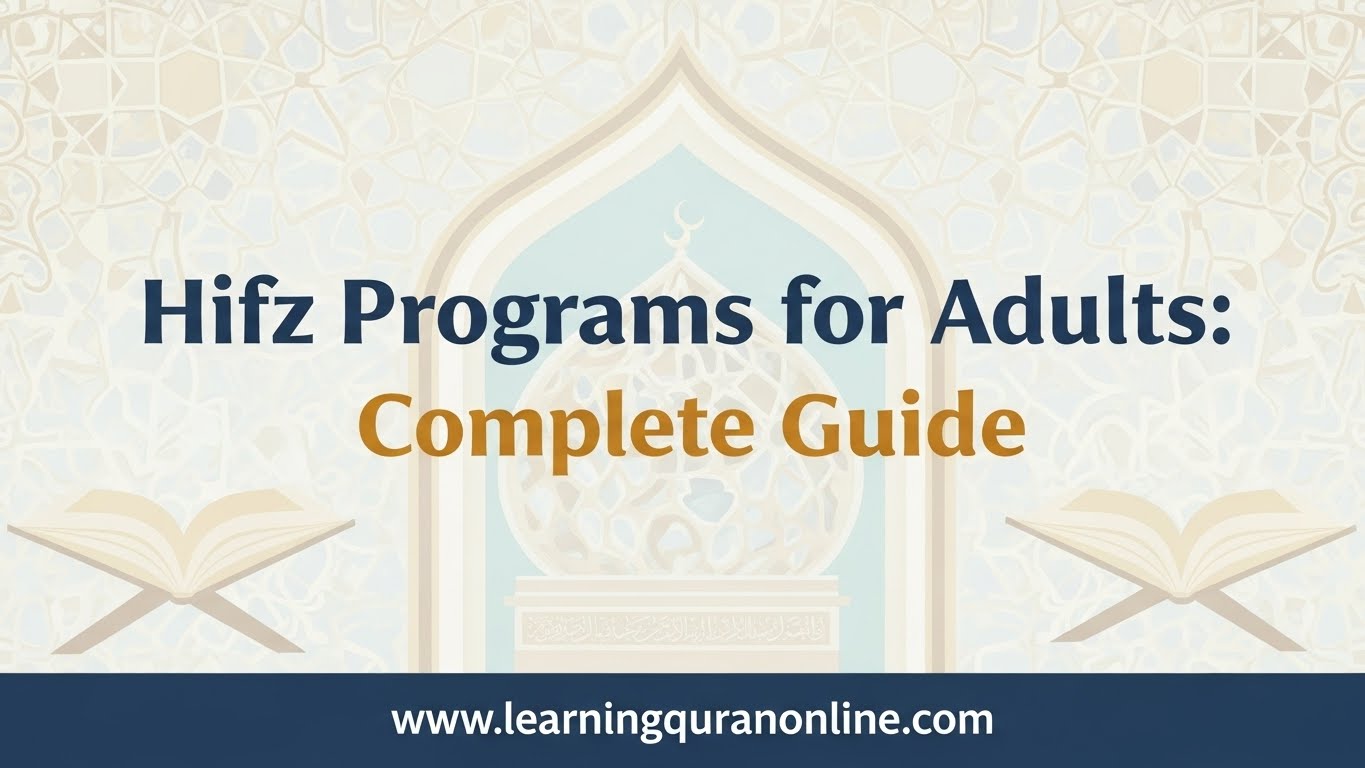Table of Contents
ToggleWhy Choose an Online Quran Academy?
Online Quran learning has grown rapidly because it blends traditional Islamic teaching with modern technology. Benefits include flexible schedules, access to qualified tutors worldwide, one-to-one and group lessons, curriculum tailored for kids or adults, and interactive tools for recitation review. Whether you seek Quran tutoring for beginners, advanced Tajweed coaching, or a structured Hifz program, online Quran classes make it easy to learn from home.
Key Factors to Consider When Selecting an Online Quran Academy
To choose the right online Quran academy, focus on these essential criteria. These cover teacher qualifications, curriculum, teaching methods, student safety, technology, trial options, and cost — all vital for a successful Quran learning journey.
1. Qualified and Experienced Quran Teachers
The quality of instructors is the single most important factor. Check if the platform hires certified teachers with strong backgrounds in Quranic recitation (Tajweed), Arabic, and Islamic studies. Look for:
- Ijazah (certification) in Quran recitation or Tajweed from recognized scholars.
- Experience teaching children and adults, and experience in online tutoring.
- Native Arabic speakers or teachers fluent in Arabic for Quranic Arabic lessons.
- Specialized Hifz (memorization) tutors if you want a memorization program.
2. Structured Curriculum and Learning Path
A reliable online Quran academy should offer a clear curriculum and measurable learning outcomes. Whether your goal is basic Quran reading, mastering Tajweed, memorizing the Quran, or studying Tafsir, the academy should provide:
- Beginner-to-advanced course levels and a placement assessment.
- Defined lesson plans, milestones, and progress tracking.
- Supplementary courses like Quranic Arabic, Islamic studies, or Seerah.
3. Teaching Method: One-to-One vs Group Classes
Decide between one-to-one online Quran classes and group sessions. Each has advantages:
- One-to-one classes: Personalized attention, faster correction of mistakes, flexible scheduling. Ideal for young children, beginners, and serious Tajweed or Hifz students.
- Group classes: Safer price point, social learning environment, good for supplementary lessons and revision.
4. Focus on Tajweed and Pronunciation
Proper Tajweed ensures accurate recitation and respect for the rules of the Quran. Verify that the online academy emphasizes:
- Individual correction of recitation and articulation (Makharij and Sifaat).
- Use of audio/video recordings for homework and recitation review.
- Structured Tajweed modules from basic to advanced levels.
5. Hifz and Memorization Programs
If memorization is your goal, investigate the academy’s Hifz program. Look for:
- A clear Hifz schedule, daily targets, and regular revision cycles.
- Qualified Hifz teachers and consistent one-to-one supervision.
- Assessment frequency, accountability measures, and backup plans for slow progress.
6. Technology, Learning Platform and Teaching Tools
An intuitive learning platform makes lessons effective. Check for:
- Video conferencing support (Zoom, Skype, proprietary platform) with stable audio/video.
- Interactive whiteboards, screen sharing for Quranic texts, and lesson recording.
- Mobile-friendly apps and downloadable resources for practice (PDFs, audio files).
7. Trial Lesson and Flexible Scheduling
A trial lesson or introductory class lets you assess teaching style, comfort level, and platform usability. Also look for:
- Flexible timings to accommodate different time zones and busy schedules.
- Easy rescheduling and make-up lesson policies.
8. Safety, Child Protection and Privacy
For children, safety is paramount. Ask about:
- Background checks on tutors and verified identities.
- Parental access to lessons, recorded sessions, and regular updates.
- Clear privacy policies and secure payment systems.
9. Pricing, Packages and Refund Policies
Compare pricing structures and what’s included in each package. Consider:
- Hourly rates vs monthly subscriptions and bundled packages.
- Discounts for multiple lessons, siblings, or long-term enrollment.
- Clear refund and cancellation policies.
10. Reviews, Testimonials and Accreditation
Look for independent reviews, student testimonials, and endorsements. Other indicators of quality include:
- A strong track record of student success (Hifz completions, measurable Tajweed improvement).
- Accreditation by reputable Islamic institutions or recommendations from scholars.
- Transparent teacher profiles with reviews and ratings.
Practical Tips: Questions to Ask Before Enrolling
Use this checklist during your research or trial conversation with an online Quran academy:
- What qualifications and certifications do your teachers hold?
- Do you offer a free or discounted trial lesson?
- How do you assess a new student’s level and place them in a suitable course?
- What is your approach to teaching Tajweed and recitation correction?
- Do you provide consistent teachers or rotate tutors?
- How do you handle missed lessons, make-up classes, and refunds?
- What safety measures are in place for children’s classes?
- Can lessons be recorded and are recordings accessible to parents/students?
Choosing the Right Program for Different Learners
Different learners have different needs. Here’s how to match an online Quran academy to common goals:
- Children: Look for patient tutors, child-friendly lesson plans, short sessions, and parental reporting.
- Beginners: Seek a step-by-step reading course, introductory Tajweed, and a friendly teacher who uses transliteration if needed.
- Advanced learners: Choose tutors specializing in tajweed mastery, maqamat, tafsir, and advanced recitation.
- Hifz students: Ensure daily accountability, dedicated Hifz supervisors, and a sustainable revision system.
- Adult learners: Prefer flexible timings, tailored pacing, and an emphasis on comprehension and tafsir.
How to Evaluate Progress and Stay Motivated
To ensure consistent improvement, select an academy that provides measurable progress reports and motivates learners:
- Regular assessments and feedback sessions with the teacher.
- Homework assignments, recorded recitations, and corrective notes.
- Recognition of milestones (completion certificates or reward systems for kids).
- Community features like group recitation sessions, competitions, or study circles.
Red Flags to Watch Out For
Avoid platforms that exhibit these warning signs:
- No clear teacher qualifications or vague bios.
- Unclear pricing, hidden fees, or pressure sales tactics.
- Poor technology (frequent disconnections, bad audio) or lack of lesson recording.
- No trial lesson or rigid cancellation policy.
- No parental involvement options for kids or no child-safety protocols.
Final Checklist: How to Choose the Right Online Quran Academy
Before you enroll, make sure the academy meets these minimum standards:
- Qualified, vetted teachers with clear profiles and certifications.
- Structured curriculum aligned with your goals (reading, Tajweed, Hifz, Arabic).
- Interactive platform with lessons recording, resources, and stable video conferencing.
- Trial lesson availability, flexible scheduling, and transparent pricing.
- Positive reviews, testimonials, and verifiable student outcomes.
- Child protection measures (for kids) and secure payment processing.
Conclusion
Choosing the right online Quran academy requires research, patience, and asking the right questions. Prioritize teacher qualifications, a structured curriculum, Tajweed emphasis, reliable technology, and safety. Start with a trial lesson to see if the teaching style and platform fit your needs. Taking these steps will help you find a trustworthy online Quran teacher or academy that supports steady spiritual growth and lifelong learning. For those comparing options, consider contacting the academy directly to discuss trial lessons and personalized plans — for example, Learning Quran Online offers trial options and structured curricula to help students make an informed decision.
May your search lead you to a supportive teacher and a productive learning environment that deepens your understanding and recitation of the Quran.
















